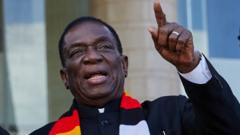Tensions in Zimbabwe rise as President Emmerson Mnangagwa appoints a new army chief in response to growing calls for his resignation from within his party and the military.
Zimbabwe's President Names New Army Chief Amid Protest Threats

Zimbabwe's President Names New Army Chief Amid Protest Threats
With increasing unrest in Zimbabwe, President Emmerson Mnangagwa has appointed a new army chief as he faces pressure from war veterans calling for his resignation.
In a significant move, Zimbabwean President Emmerson Mnangagwa has announced the appointment of Emmanuel Matatu, a former major general and veteran of the liberation war, as the new chief of the army. This decision comes in light of planned protests on Monday initiated by a faction of war veterans seeking to oust the president due to accusations of mismanagement and corruption.
Matatu's appointment is immediate, following the unexpected retirement of the former army chief, Lt Gen Anselem Sanyatwe, who has been reassigned as minister of sports, arts, and culture. At 72 years old, Matatu is a seasoned figure in Zimbabwe's political landscape, having trained in Zambia as a member of the Zimbabwe People's Republic Army (Zipra) during the struggle against white-minority rule.
Observers note that Matatu is seen as aligned with the current commander of the Zimbabwe Defence Forces (ZDF), Philip Valerio Sibanda, which may help to consolidate power within the military and provide a sense of security for President Mnangagwa. Sibanda, like Matatu, is also a veteran of the Zipra faction, which historically was in rivalry with the Zanu party, led by Robert Mugabe and Mnangagwa himself.
The cohort of war veterans pushing for the upcoming protests is advocating for Vice-President Constantino Chiwenga to assume the presidency, indicating a potential power struggle within the ruling Zanu-PF party. According to the state-owned Chronicle newspaper, Matatu's promotion is part of an initiative to bolster the leadership of the country's defence forces during a period of instability.
Strikingly known as "The Crocodile," Mnangagwa assumed the presidency in 2017 after a coup that uprooted long-standing leader Mugabe. Although he is currently in his second and final term set to conclude in 2028, skepticism regarding his intentions to relinquish power continues, especially after recent remarks hinting at a potential extension of his presidency.
While the war veterans claim to have the backing of the public for their protests, officials have cautioned against participation, and police have imposed a four-day ban on carrying weapons or items associated with violent acts in the capital. With historical tensions resurfacing, the outcome of the planned protests remains uncertain, but the political landscape in Zimbabwe is evidently in a precarious state.
Matatu's appointment is immediate, following the unexpected retirement of the former army chief, Lt Gen Anselem Sanyatwe, who has been reassigned as minister of sports, arts, and culture. At 72 years old, Matatu is a seasoned figure in Zimbabwe's political landscape, having trained in Zambia as a member of the Zimbabwe People's Republic Army (Zipra) during the struggle against white-minority rule.
Observers note that Matatu is seen as aligned with the current commander of the Zimbabwe Defence Forces (ZDF), Philip Valerio Sibanda, which may help to consolidate power within the military and provide a sense of security for President Mnangagwa. Sibanda, like Matatu, is also a veteran of the Zipra faction, which historically was in rivalry with the Zanu party, led by Robert Mugabe and Mnangagwa himself.
The cohort of war veterans pushing for the upcoming protests is advocating for Vice-President Constantino Chiwenga to assume the presidency, indicating a potential power struggle within the ruling Zanu-PF party. According to the state-owned Chronicle newspaper, Matatu's promotion is part of an initiative to bolster the leadership of the country's defence forces during a period of instability.
Strikingly known as "The Crocodile," Mnangagwa assumed the presidency in 2017 after a coup that uprooted long-standing leader Mugabe. Although he is currently in his second and final term set to conclude in 2028, skepticism regarding his intentions to relinquish power continues, especially after recent remarks hinting at a potential extension of his presidency.
While the war veterans claim to have the backing of the public for their protests, officials have cautioned against participation, and police have imposed a four-day ban on carrying weapons or items associated with violent acts in the capital. With historical tensions resurfacing, the outcome of the planned protests remains uncertain, but the political landscape in Zimbabwe is evidently in a precarious state.



















